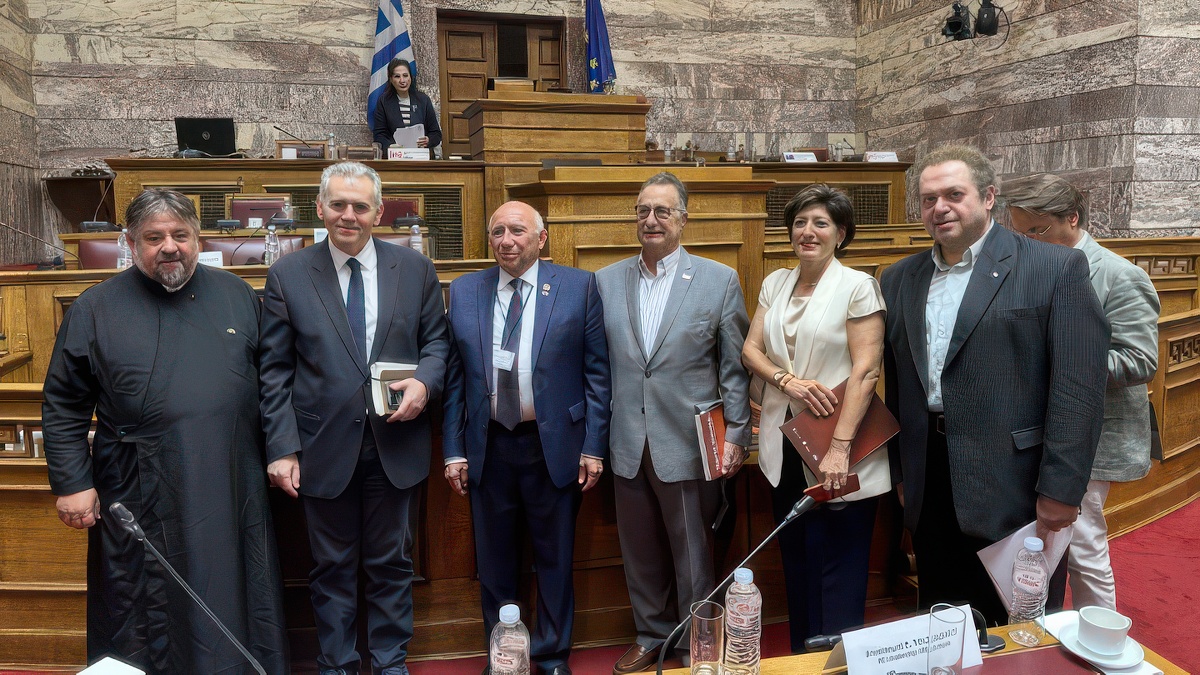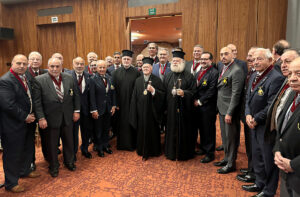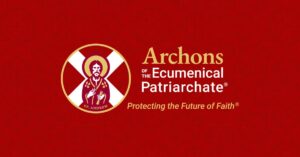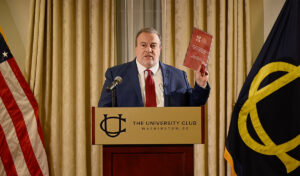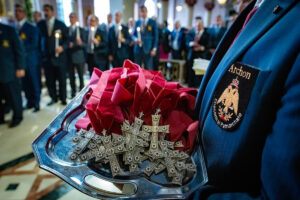The issue of religious freedom was a primary focus of discussion at the 15th General Assembly of the World Hellenic Inter-Parliamentary Association (PADEE-WHIA), which was held on July 23, 2025 in the Senate Hall of the Hellenic Parliament in Athens. The Association unanimously adopted a resolution condemning governments and regimes around the world that violate this fundamental freedom. Playing a pivotal role in the proceedings was Archon Manolis Velivasakis, who delivered a major speech on the plight of the Ecumenical Patriarchate, and the importance of safeguarding its rights. Also present was Archon George Zapantis.
The Association’s resolution is a forceful statement for the defense of human rights and religious freedoms, with a particular focus on the persecution that Christian communities and the ancient Patriarchates in the Middle East, Asia Minor, and Africa are facing today. The resolution calls attention to some of the major transgressions against religious freedom worldwide today:
- It denounces Turkey’s refusal to grant legal status to the Ecumenical Patriarchate, the confiscation of its properties, and other obstacles imposed by Turkish authorities, such as in patriarchal succession and visa issuance. In his speech to the Assembly, Archon Velivasakis addressed these issues in detail.
- It points out the illegal claims made by the Moscow Patriarchate over canonical territories of the Patriarchate of Alexandria.
- It highlights the violence and discrimination faced by the Patriarchate of Antioch in the aftermath of the Syrian war.
- It condemns attacks on pilgrims to the Patriarchate of Jerusalem, and expresses concern over Egyptian authorities’ questioning of the status of the historic Monastery of Saint Catherine in Sinai.
The Resolution calls upon the governments of the United States, Canada, Australia, and European Union member states to prioritize human rights, and urges the governments of Turkey, Syria, and Egypt to honor their international obligations.
Before the vote, distinguished speakers were invited to present relevant issues, addressing the existential problems of the ancient Patriarchates, the illegal desecration of religious sites, and the broader oppression of the Holy Orthodox Church around the world.
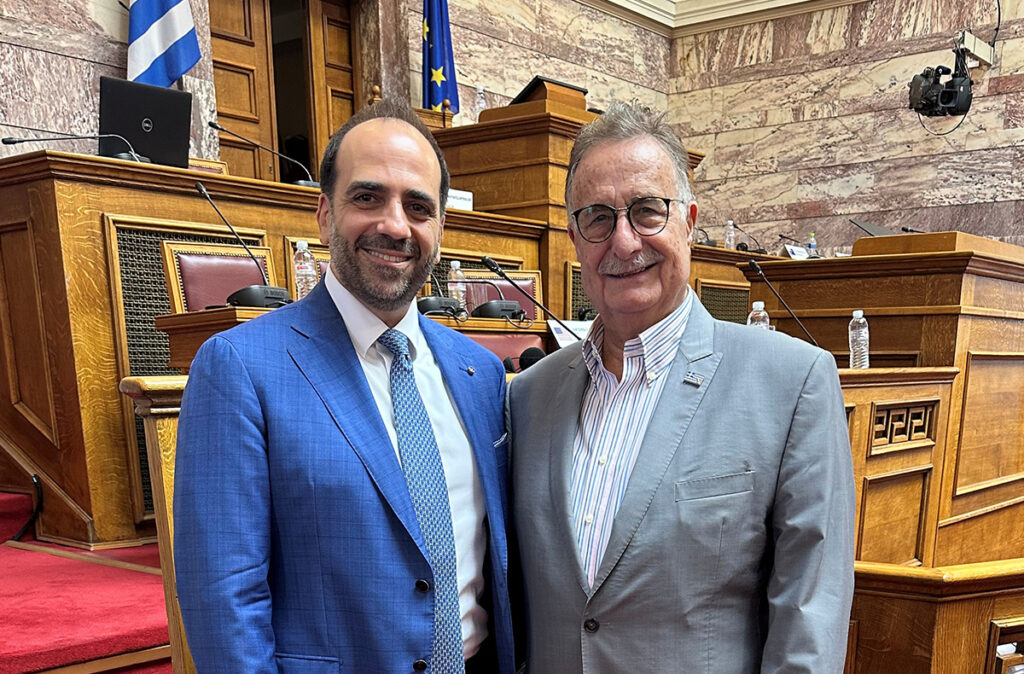
Archon Velivasakis, a FOUNDER of the Ecumenical Patriarch Bartholomew Foundation, delivered a magnificent example of what it means to give of one’s time, talent and treasure as an Archon of the Ecumenical Patriarchate. He gave an in-depth presentation on the Ecumenical Patriarchate of Constantinople and the existential issues it faces under Turkey’s authoritarian regime. On the Patriarchate of Alexandria and the severe challenges posed by illegal takeovers of its communities, churches, and schools in Africa by the Russian Church, Archbishop Ioannis of Zambia and Mozambique delivered a statement.
On the broader issue of religious freedom, persecutions, and existential threats facing Orthodoxy globally, Dr. Maximos Charakopoulos, Secretary General of the Interparliamentary Assembly on Orthodoxy, spoke in detail. He also addressed the recent controversy over the ownership of Saint Catherine’s Monastery in Sinai, the conversion of Hagia Sophia in Constantinople and other Orthodox monuments/churches into mosques, and other burning issues related to the suppression of Orthodoxy.
The PADEE-WHIA General Assembly also took the initiative to promote similar resolutions in the legislative assemblies and senates of its member countries, aiming to uphold the sacred and democratic values of religious freedom and human rights.
Here is the full text of the speech by Archon Manolis Velivasakis:
Your Excellencies, ladies and gentlemen,
My name is Manolis Velivasakis, and today I speak on behalf of the Archons of the Ecumenical Patriarchate on the issue of Religious Freedom and the existential challenges faced daily by our Ecumenical Patriarchate in Constantinople.
I thank you for the opportunity to address this distinguished body of elected Hellenic legislators from across the globe and to support the proposed RESOLUTION on RELIGIOUS FREEDOM, which is on today’s agenda for consideration and approval.
Religious freedom is a matter of deep concern for millions of believers worldwide. Today, I want to focus on the ongoing and blatant violations of religious freedom faced by the Ecumenical Patriarchate of Constantinople, and by extension, the challenges encountered by all religious minorities in the Republic of Turkey.
The Ecumenical Patriarch, His All-Holiness Bartholomew I, is the spiritual leader of more than 300 million Orthodox Christians worldwide. The Patriarchate, based in Constantinople, has stood for seventeen centuries as a beacon of peace, spiritual guidance, and interfaith dialogue.
And yet, this ancient institution—so central to the Christian world—lacks legal recognition in its own homeland.
Legal Invisibility and Loss of Property
Perhaps the most fundamental issue is that the Ecumenical Patriarchate has no legal personality under Turkish law. It cannot own property. It cannot file lawsuits. It cannot even hire staff in its own name.
Instead, it must rely on Ottoman-era religious foundations, which are regulated by the Turkish state. These foundations fall under the jurisdiction of the General Directorate of Foundations, which controls the sale, maintenance, and use of properties that rightfully belong to the Church. This system gives the state near-total control over the Patriarchate’s physical survival.
Over the last century, hundreds of church-owned properties—churches, schools, orphanages—have been confiscated or transferred. One of them is the orphanage on the island of Büyükada (Prinkipos), an enormous wooden building and one of the largest of its kind in Europe. Although the European Court of Human Rights ordered its return in 2010, it remains abandoned trapped in legal and bureaucratic limbo.
Allow me a personal note: a few years ago, in my capacity as a Structural Engineer, I personally visited and inspected the Orphanage building at the request of His All-Holiness, and I can testify to its dangerous and delipidated condition, mainly due to weather damage and deliberate neglect during the years it has remained closed.
Restrictions on Succession and Citizenship
Turkish law requires that the Ecumenical Patriarch be a Turkish citizen. This restriction severely limits the number of potential successors. The once-thriving Greek Orthodox population of Turkey—more than 100,000 in the early 20th century—now numbers fewer than 2,000.
Although some diaspora bishops have been naturalized, this is no substitute for true religious autonomy. A Church cannot operate freely when the state dictates the nationality of its leadership.
Closure of the Halki Theological School
In 1971, Turkey closed the Halki Theological School—the Patriarchate’s principal educational institution—citing a law against private higher education. For over 50 years now, the Church has been unable to train its clergy on its own soil.
Many Turkish governments have promised to reopen Halki. None have done so. The result is an aging clergy and a serious threat to the continuity of the Church’s spiritual mission.
Denial of Ecumenical Status and Religious Expression
Turkey refuses to recognize the “ecumenical” status of the Patriarchate, insisting that the Patriarch is merely the religious leader of Istanbul’s Greek minority. This political denial contradicts international recognition of the Ecumenical Patriarch as “first among equals” in the global Orthodox Church.
Even more troubling, the state prohibits Orthodox clergy from wearing their robes or religious symbols in public. A priest walking to his church cannot wear a cassock or a cross. These restrictions are not merely symbolic affronts—they are violations of religious expression and identity.
Intimidation, Surveillance, and Visa Denials
The Patriarchate operates under constant surveillance. Its clergy and visitors from abroad are monitored. In some cases, bishops and theology students face delays or outright denials of visa applications. Let us not forget that in 2004, Turkish authorities uncovered a plot to assassinate Patriarch Bartholomew. Since then, he has remained under armed police protection.
This is not the image of a religious leader functioning freely. It is the image of a spiritual figure marginalized under state control.
Wider Context: Religious Freedom in Turkey
These challenges do not affect only the Orthodox Church. Armenian, Jewish, and Syriac Christian communities—as well as Alevi Muslims—face similar restrictions.
Meanwhile, the Directorate of Religious Affairs (Diyanet) receives massive state funding to support Sunni Islam, while non-Muslim religions receive none. The result is structural inequality—a situation that undermines the pluralism and integration that modern democracies should uphold.
A Call to Action
Despite these difficulties, Ecumenical Patriarch Bartholomew has emerged as a global voice for peace, ecological justice, and interfaith dialogue. But that voice is weakened when it is confined by legal ambiguity and institutional hostility.
If Turkey is to uphold its international commitments and be counted among fully democratic nations, it must:
- Legally recognize the Ecumenical Patriarchate
- Fully restore its property rights and institutional autonomy
- Reopen the Halki Theological School without delay
- Abolish the Turkish citizenship requirement for electing a Patriarch
- Allow clergy to wear religious garments publicly
- End surveillance and intimidation of religious institutions
- Facilitate visa issuance for foreign clergy and students
Conclusion
The story of the Ecumenical Patriarchate is not merely the story of a Church—it is a test of religious freedom, pluralism, and the dignity of faith in today’s world.
Let us all work together so that this ancient beacon of faith is not extinguished by legal shadows but continues to shine freely, as it has for seventeen centuries.
Finally, I CHALLENGE you, dear friends, to consider introducing the RESOLUTION you are about to adopt today into your own legislatures, if you have not already done so, and to pass it—so that your colleagues too may be awakened to the issue of religious freedom.
Because we will need ALL OF US, across the world, to bring about change!
